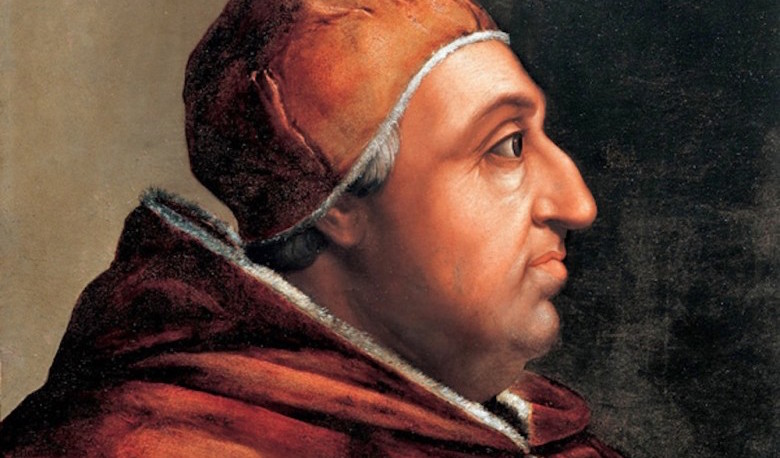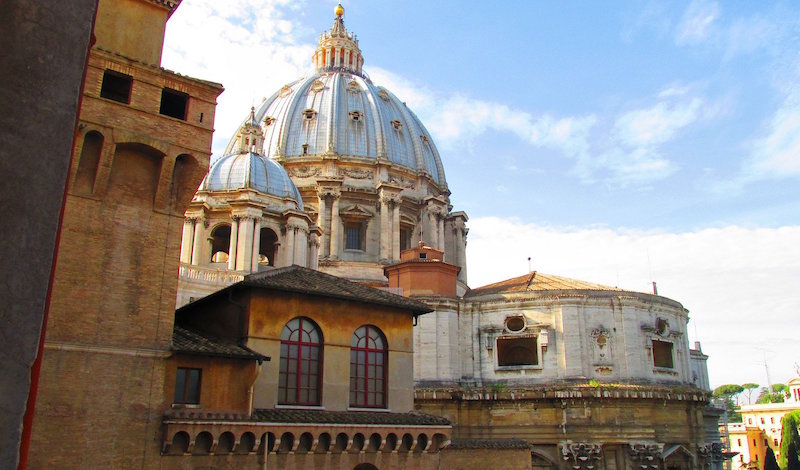I wrote earlier about Pope Alexander VI, by way of the rogue’s gallery arrayed against him and his treacherous bastard son Cesare Borgia. While Alexander was a fascinating (and awful) figure, the most gameable part of his life is probably his death and the immediate fallout from it. It’s a sort of foreseeable anarchy that ports very well to the gaming table! Let’s look at the absolutely nuts events surrounding Alexander’s death, and then talk about how to use them in a heist or political adventure in your campaign.

Alexander VI was born Rodrigo Borgia to a Spanish noble family. He purchased an archbishopric and clawed his way up the Church hierarchy through a combination of political acumen and legitimately excellent administrative skill. He made a great noble, but a terrible clergyman. He openly kept concubines, partied hard with prostitutes and wine, fathered numerous bastard children, and had opponents killed. In 1492, upon the death of the sitting pope, he bribed the electors to make him pope and took the name Alexander VI. Using the power of the Papacy, he legitimized several of his bastard children (most notably Cesare and Lucrezia Borgia). He set them to work at carving out a Borgia kingdom in Italy, backed by the power and wealth of the papacy in Rome. His secret goal was to unite Italy’s warring city-states under a single king – a Borgia king.
In August of 1503, a terrible fever was ravaging Rome. August 11th was the anniversary of Alexander VI’s papal coronation, a day the debauched 72-year-old usually enjoyed with gusto. But instead he seemed uninterested. The next day, he came down with some sort of vomiting disease. His son, Cesare, was about to ride out to war, but he was stricken by the same symptoms. Both men were bedridden. On August 15, Cesare’s doctors lowered him into an urn filled with ice water. The shock was so great all his skin peeled from his body and he sank into delirium. By August 17, Pope Alexander was on death’s door.
The Vatican descended into a very quiet pandemonium. Papal succession was supposed to be a solemn, even dull affair. But with all papal norms shattered by Alexander’s behavior, no one knew how Rome and its nobles would react. Everyone tried to secure their wealth and property without making it known they were doing so, lest they seem disloyal.

Alexander VI died on August 18. His son Cesare would need to act fast to safeguard the Borgia family’s holdings, now that they were no longer protected by the papacy. But he was still laid up, unable to do anything but give orders. So he sent a trusted lieutenant, Don Michele, sometimes called ‘Valentino’s Executioner’ or ‘The Strangler’.
Don Michel burst into the papal apartments with an escort of armed men. They threatened a cardinal into handing over the keys to the papal treasure chamber. From it, they stole some 400,000 ducats’ worth of gold, plate, jewels, art, and coinage. For context, the pope’s annual income was around 300,000 ducats, and Cesare’s last war cost 1,000 ducats a day. Despite Don Michel’s enormous haul, he actually missed a second treasure chamber, leaving behind an unknown amount.
While the Borgias disrespected the papal office, the Church disrespected Alexander VI. The night of his death, Alexander’s body laid out in state. No one stood vigil beside it. With Cesare indisposed, no one cared enough about the old dead villain to lose a night’s sleep for him. The next morning, attendants loaded the body onto a bier and tried to carry it to St. Peter’s basilica. But a troupe of Vatican guards tried to steal the gold candlesticks the attendants were carrying. In the ensuing scuffle, everybody dropped the body and kind of forgot about it. Folks had to come back later and drag it into the basilica.
Alexander was to be buried at once. His body was decomposing so rapidly that – though he was already famously fat from his debauches – his swollen corpse was soon as wide as it was tall. No one wanted to touch the thing. Instead, a porter tied a rope around the feet of the corpse and dragged it along the ground to the grave. There, the burial detail discovered the coffin was too small for the swollen body. Quoting the Vatican master of ceremonies at the time: “So they bent the mitre, wrapped the body in some old cloth, and began stuffing it into the coffin anyhow, pummeling at it with their fists to make it fit.”
Within days, a wild rumor spread across Italy (within weeks, across Europe) about Alexander’s death. According to the rumor, he and Cesare poisoned a rich cardinal’s wine at a dinner party so they could steal his property. There was some confusion, and all three accidentally drank the poison. This rumor should not be discounted out of hand. Alexander and Cesare had pulled this stunt before, and all three men did fall ill at the same time. Nonetheless, the symptoms described don’t match the symptoms of the Borgia’s usual poison, a white powder called cantarella. It is perhaps more likely that all three men just caught malaria at the same time. Normally, the papal court left marshy Rome for the pestilential summer months, but the Borgias refused that year, due to the tense political situation.

Post-mortem pandemonium based on the death of Alexander VI works well in any setting where a despised monarch or religious leader can die unexpectedly. It works particularly well as background for a heist. The fabled wealth of the palace will tempt your PCs, and the chaotic environment opens new avenues of attack. Furthermore, Don Michel does the GM a huge favor. By making off with much of the treasure, he lets you tailor the size of your party’s haul appropriately. Since it’s unclear how much wealth he left behind, the amount the PCs find can be rewarding, but not game breaking.
Alternately, while Don Michel and the Vatican guards are stealing money, your party may want to steal the pope’s body. The body parts of saints are holy in Catholic teaching. It stands to reason that the body of Alexander VI, a monstrous and despised clergyman, might be unholy. Players might have a lot of fun racing to recover the body before the forces of darkness can use it for their evil ends.
There’s also the political angle. Successions are messy business. After the death of a despised ruler without a clear successor, the throne is in many ways up for grabs. The first person with a little legitimacy to seize the palace or the treasury – the physical reins of power – is at a serious advantage in the resulting succession crisis. Ambitious PCs may try to snatch the throne for themselves or for a patron during the chaos. (Obviously, this wouldn’t work for the real papacy, whose rules of succession are arcane and generally well adhered to.)

Separately, would you like a FREE Molten Sulfur one-shot? I’m looking for blind playtesters for two of the one-session games included in my next book, Making History. I would send you a free draft copy of the game, complete with a one-session adventure, pregenerated characters, all the necessary handouts, and the very simple rules set. You run the one-shot for your gaming group, record it, and I thank the heck out of you.
The two games are:
Darken Ship. As junior sailors aboard a U.S. warship, you awake to find you’re alone on a vessel that should carry 3,000. As you explore the dimly-lit passageways, you will uncover clues about what’s going on, and may even save the ship. A military game with strong horror elements.
A Killing in Cahokia. In the year 1100, the Mississippi river valley was dominated by a powerful Native American kingdom. Its mound-bedecked capital, Cahokia, was a stone age city larger than London at the time. You are detectives investigating the murder of a Cahokian priest, but will get pulled into something much bigger. A game about the tradeoffs of civilization and who gets to decide what form a society should take.
If you’re interested, contact me. Let’s make this happen!
–
Source: The Artist, the Philosopher, and the Warrior: Da Vinci, Machiavelli, and Borgia and the World They Shaped, by Paul Strathern






